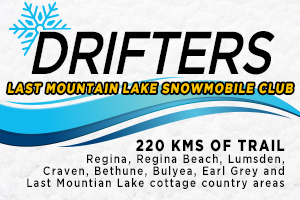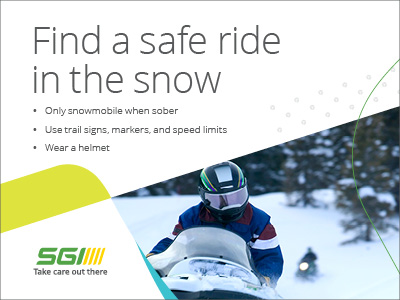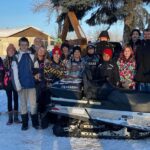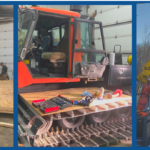RCMP: More snowmobile trail safety patrols are planned for 2023
The following is an excerpt from the RCMP. View it here: https://www.rcmp-grc.gc.ca
January 17, 2023
Prince Albert, Duck Lake, Rosthern, Saskatoon, Saskatchewan
50% of snowmobiles stopped during a December 30 patrol were not registered
50% of snowmobiles (six out of a dozen) stopped by RCMP officers were not registered during a December 30, 2022 patrol in the Prince Albert, Duck Lake and Rosthern, SK areas. Identification determined the snowmobile operators whom police officers encountered were not just from the immediate area, but Saskatoon and beyond. These individuals were just a handful of the hundreds police interact with on snowmobile trails throughout the winter months. December 30 was a Friday and during most weekend trail patrols, police officers typically encounter around 75 snowmobiles, depending on the location.
To avoid a $175 ticket, all you have to do is register your snowmobile – which costs considerably less than the ticket if you only register it for a few months per year!
You can register your snowmobile at any motor license issuer in Saskatchewan. Riders must have their snowmobile registered before they ride it on public roads (where allowed) ditches, other highway rights of way, provincial parks, Crown land, designated snowmobile trails or on rivers or lakes.
“This also means 50% of snowmobiles were registered – so credit to those who registered before they went out on the trails,” says Sergeant Jeremy Knodel of Combined Traffic Services Saskatchewan. “Last winter, our enforcement team completed around six snowmobile patrols in our RCMP North District and 85-90% of the snowmobiles we encountered were registered properly. There’s lots of winter left and we’re hopeful that 50% can be bumped up to meet or exceed what we encountered last winter season. Our teams are working to keep people safe on the roads and on the trails so everyone can enjoy this seasonal activity.”
Impaired riding always on police radar
“When conducting snowmobile trail patrols, we are always on the lookout for impaired riders” adds Sgt. Knodel. He notes that consuming alcohol or drugs in warm-up shelters is not permitted – they are alcohol-free and family-friendly zones and someone violating this could be issued a $250.00 ticket. This, in addition to the obvious dangers associated to impaired driving. “A snowmobile is still a vehicle. We want everyone on the trails to enjoy them safely and part of this is enforcing no alcohol or drug use.”
RCMP officers will also be actively monitoring snowmobile loading/unloading zones to help ensure no one is driving impaired on Saskatchewan roads.
Do RCMP snowmobiles have flashing lights?
One of the positives – Sgt. Knodel says all snowmobile operators and riders they’ve encountered thus far this winter were wearing a helmet. Wearing proper protective equipment is essential in keeping riders and passengers safe.
“RCMP snowmobiles are equipped with flashing lights,” tells Sgt. Knodel. “If you see us out on the trails and our emergency lights are activated, slow down and pull to the side, just as you would while operating a vehicle on a road. We also stop at warm-up shelters and may ask you to present your snowmobile registration.”
Snowmobile Safety Week
January 15-21, 2023 marks Snowmobile Safety Week. Police and partner patrols on Saskatchewan snowmobile trails this season are one part of helping to ensure people stay safe while enjoying one of the province’s most popular winter sports, but we can’t be everywhere!
Help contribute to trail safety by wearing proper protective equipment and weather-appropriate clothing, don’t ride impaired, register your snowmobile and check local trail conditions. Always share your snowmobiling plans with someone before you head out, pack extra supplies and ensure your cell phone is charged.
Combined Traffic Services Saskatchewan officers have completed several joint patrols with conservation officers with the Provincial Protective Services Branch and Lakeland District Protective Services. These partnerships create more officer presence and awareness on the trails.




































